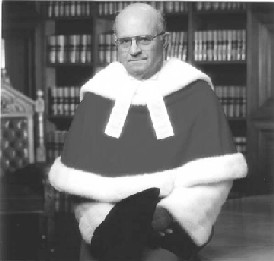In return he tells me a bit about himself, starting
with two plaques on the wall above us. One plaque declares him an
honourary citizen of an Italian town called Mongone and the other
an honourary citizen of a town called Abruzzo. These are the hometowns
of his mother and father and Justice Iacobucci upholds them as the
greatest honours he has received throughout his extensive career.
Justice Iacobucci is quite proud of his Italian heritage.
He is past-president of the National Congress of Italian-Canadians
in Toronto, is frequently involved with the Italian community here
in Ottawa, and even has a tiny Italian flag sitting on his office
desk.
“My Italian is a little rusty though, even though
I’m sure it was the first language I learned,” he says,
remembering his childhood in Vancouver.
Growing up during the war, Justice Iacobucci’s
parents encouraged him to learn and practise English.
“It wasn’t very fashionable to speak Italian
in those times and my parents knew that in order to make a life here
in Canada, you needed English.”
However, being Italian was always very important to
his parents. When his older brother Danny jokingly suggested they
change their last name to Sullivan because it was easier to spell
and didn’t stand out as much, Gabriel Iacobucci promptly reprimanded
him for making such a suggestion.
In his youth, Justice Iacobucci didn’t think
much about law. He started off wanting to be a doctor.
“That quickly fell short because I can’t
stand blood,” he laughs as he nestles into an armchair.
It was his elementary school principal who set the
wheels turning in Justice Iacobucci’s head when he compared
the talkative grade six student to a lawyer. Since that point, Justice
Iacobucci has built a distinguished career in law. He studied at the
University of British Columbia, St. John’s College at Cambridge
University and the University of Toronto. He would eventually teach
at the University of Toronto, be involved with numerous associations
and committees, as well as receive a number of awards, before being
appointed to the Supreme Court in 1991.
It was at a law firm in New York City where he met
his wife Nancy. The pair was married in 1964. Justice Iacobucci credits
a lot of his success to the continuous support of his wife, a Harvard
law school graduate who, in his opinion is smarter than he is. Family
is the most important thing in Justice Iacobucci’s life. He
fondly speaks of his wife and his eyes light up as he informs me he’s
just become a grandfather.
“I’ve been very lucky in all aspects of
my life,” he says.
There are a few things Justice Iacobucci admits he
would like to have done in his lifetime that he never had the chance
to accomplish.
“I would have liked to have been the manager
of a major league baseball team. Baseball’s always been one
of my first loves,” he smiles, no doubt envisioning himself
in a team jacket drumming up strategies for his all-star players.
When he eventually decides to lay aside his career,
Justice Iacobucci plans to undertake reading and cooking. He has an
unbridled passion for food shopping and cooking. Spending time with
his grandchildren is also high on his list of priorities.
I spend about 20 minutes after my interview chatting
with Justice Iacobucci about life and my future. He took as keen an
interest in what I planned to do with my life as I had in what he’d
done with his. I tell him about the ambitions I have, no matter how
far-flung they might be, and he shares with me his own personal credo
borrowed from Robert Browning.
“A man’s reach should exceed his grasp,
else what’s a heaven for?” recites Justice Iacobucci.
“Beautiful isn’t it?”
After almost an hour, I gather my notes, having taken
up enough of Justice Iacobucci’s time.
“Oh, I have to give you a gift,” he says,
hurrying over to his desk. He yanks open a couple of drawers before
he pulls out a Supreme Court pin, which he promptly hands to me.
“It’s beautiful,” I say, speaking
more of the gesture.
“Well no, not really,” Justice Iacobucci
says as he looks at the pin. “It’s actually kind of ugly
but still, a souvenir.”
His assistant retrieves my coat for me and Justice
Iacobucci chats with me for a few minutes longer. As I head out the
door to join Mike, who is patiently waiting in the hallway, Justice
Iacobucci wishes me all the best in future endeavours with a happy
wave. Mike escorts me back down in the elevator to the entrance.
“Yes, he’s an extremely nice man Miss,”
he says to me as we approach the main desk. “Very smart, very
grounded.”
Waving goodbye to my friendly escort, I push through
the heavy revolving doors and quickly hop down the steps of the courthouse,
thinking how cozy it is inside.

